Studi di storia
open access | peer reviewed
Presentazione
La collana, coordinata da Laura Cerasi, Mario Infelise e Anna Rapetti, si propone di ospitare studi di storia medievale, moderna e contemporanea, spaziando tra la dimensione locale della storia veneziana e veneta e quella ampia della storia europea ed extraeuropea. “Studi di storia” intende dedicare particolare attenzione alle ricerche che adottino una prospettiva di indagine interdisciplinare e che siano aperte ai contatti con le scienze sociali. Vi troveranno spazio pubblicazioni che scaturiscono dalle attività di ricerca di Ca’ Foscari e pubblicazioni di studiosi e istituzioni italiane e straniere che contribuiscano a mettere in evidenza la rete delle collaborazioni nazionali e internazionali dell’Ateneo in ambito storico.
Permalink doi.org | e-ISSN 2610-9107 | ISSN 2610-9883 | Lingua de, en, fr, it | ANCE E238407
Sottoserie
Strumenti
e-ISSN
2610-9115
Copyright This is an open-access work distributed under the terms of the Creative Commons Attribution License (CC BY). The use, distribution or reproduction is permitted, provided that the original author(s) and the copyright owner(s) are credited and that the original publication is cited, in accordance with accepted academic practice. The license allows for commercial use. No use, distribution or reproduction is permitted which does not comply with these terms.
Ultimo volume pubblicato

- Dietro le quinte dell’Impero
- Biografie e prosopografie nell’Europa napoleonica
- Valentina Dal Cin
- 27 Ottobre 2025
Ponendosi in continuità con la storiografia più recente, che ha considerato il Grand Empire come un’impresa collettiva, questo volume esplora le vite di personaggi che non sempre salirono alla ribalta, ma il cui contributo è necessario per una comprensione approfondita delle dinamiche politiche, istituzionali, culturali e socioeconomiche proprie dell’età napoleonica. L’analisi di sette casi di studio rivela le diverse sfaccettature delle carriere di italiani che collaborarono con il nuovo regime in patria e in Francia, e dei percorsi di francesi che lavorarono in Italia, modelli possibili di un amalgama imperiale in formazione. Le loro storie rivelano come ciascuno avesse contribuito alla costruzione napoleonica, cogliendo al tempo stesso le nuove opportunità offerte dal regime. La professionalità e le capacità di cui questi personaggi diedero prova non si persero con il crollo dell’impero: al contrario, assunsero allora il ruolo di garanti della continuità, fungendo da trait-d’union con i governi successivi. Proprio per superare le cesure politico-istituzionali, questo volume si addentra nelle vicende dei singoli, poiché è dal loro intreccio nel tessuto sociale del tempo che può nascere una visione più ricca e allo stesso tempo più sfumata di un’epoca di trasformazioni.
- 2 download 36 search
- Alla ricerca del bibliotecario repubblicano: logiche e pratiche di reclutamento nell’Italia Cisalpina (1797-1802)
- Francesco Dendena
- Dietro le quinte dell’Impero
- 74 download 471 search
- Bibliografia
- Costanza Diciommo
- Guida alla tesi di laurea in Storia
- 16 download 161 search
- Bibliografia
- Venezia e il Peloponneso, 992-1718
- 2 download 33 search
- Carlo Lauberg fra farmacia e politica: una militanza nascosta, ma non dimenticata
- Paolo Conte
- Dietro le quinte dell’Impero
- 1 download 29 search
- Carlo Marieni, tra rivoluzione e restaurazione
- Cecilia Carnino
- Dietro le quinte dell’Impero
- 1 download 23 search
- Costruire e ricostruire una carriera attraverso le cesure politiche: Carlo Camillo Trompeo
- Valentina Dal Cin
- Dietro le quinte dell’Impero
- 6 download 301 search
- Das Staat-Kirche-Verhältnis in Bayern nach dem Ersten Weltkrieg
- Florian Heinritzi
- Pio XI nella crisi europea | Pius XI. im Kontext der europäischen Krise
- 10 download 426 search
- Die lehramtliche Verurteilung des «Mythus des 20. Jahrhunderts»
- Dominik Burkard
- Pio XI nella crisi europea | Pius XI. im Kontext der europäischen Krise
- 17 download 616 search
- Elia Dalla Costa e il fascismo italiano (1923-1943)
- Enrico Baruzzo
- Pio XI nella crisi europea | Pius XI. im Kontext der europäischen Krise
- 27 download 321 search
- Historiae
- Claudio Azzara, Ermanno Orlando, Marco Pozza, Alessandra Rizzi
- Historiae
- 0 download 187 search
- Il mondo nuovo
- Valentina Dal Cin
- Il mondo nuovo
- 8 download 327 search
- Il pontificato di Pio XI e la violenza politica
- Lucia Ceci
- Pio XI nella crisi europea | Pius XI. im Kontext der europäischen Krise
- 14 download 336 search
- Il ripensamento dell’antisemitismo da parte di Pio XI
- Giovanni Vian
- Pio XI nella crisi europea | Pius XI. im Kontext der europäischen Krise
- 4 download 269 search
- Introduzione
- Raffaella Perin
- Pio XI nella crisi europea | Pius XI. im Kontext der europäischen Krise
- 1 download 27 search
- Introduzione
- Valentina Dal Cin
- Dietro le quinte dell’Impero
- 48 download 419 search
- L'accesso alle risorse
- Costanza Diciommo
- Guida alla tesi di laurea in Storia
- 31 download 311 search
- La conclusione del lavoro
- Costanza Diciommo
- Guida alla tesi di laurea in Storia
- 5 download 326 search
- La donna, i bambini e la famiglia nella condanna vaticana del totalitarismo sovietico negli anni Venti e Trenta
- Laura Pettinaroli
- Pio XI nella crisi europea | Pius XI. im Kontext der europäischen Krise
- 17 download 324 search
- La questione della Palestina
- Paolo Zanini
- Pio XI nella crisi europea | Pius XI. im Kontext der europäischen Krise
- 41 download 343 search
- La schedatura del materiale
- Costanza Diciommo
- Guida alla tesi di laurea in Storia
- 120 download 540 search
- La stesura dell'elaborato: criteri generali e regole redazionali
- Costanza Diciommo
- Guida alla tesi di laurea in Storia
- 18 download 361 search
- La svolta di fine pontificato
- Raffaella Perin
- Pio XI nella crisi europea | Pius XI. im Kontext der europäischen Krise
- 124 download 610 search
- La tesi di laurea e la ricerca storica
- Costanza Diciommo
- Guida alla tesi di laurea in Storia
- 8 download 335 search
- Le illusioni di Pio XI di fronte alla rivoluzione nazista (1933-1934)
- Marie Levant
- Pio XI nella crisi europea | Pius XI. im Kontext der europäischen Krise
- 8 download 275 search
- Papst – Krise – Historiographie
- Hubert Wolf
- Pio XI nella crisi europea | Pius XI. im Kontext der europäischen Krise
- 9 download 289 search
- Pio XI dalla ‘bianca Brianza’ al governo della Chiesa universale
- Raffaella Perin
- Pio XI nella crisi europea | Pius XI. im Kontext der europäischen Krise
- 8 download 429 search
- Pius XI. – ein europäischer Papst?
- Verena Bull
- Pio XI nella crisi europea | Pius XI. im Kontext der europäischen Krise
- 13 download 395 search
- Pius XI. und Pius XII.
- Sascha Hinkel
- Pio XI nella crisi europea | Pius XI. im Kontext der europäischen Krise
- 3 download 284 search
- Plädoyer für die künftige Beschäftigung mit dem Pontifikat Pius‘ XI.
- Dominik Burkard
- Pio XI nella crisi europea | Pius XI. im Kontext der europäischen Krise
- 73 download 426 search
- Premessa
- Alessandra Rizzi
- Guida alla tesi di laurea in Storia
- 9 download 326 search
- Reform der Weltkirche durch Reform der theologischen Studien
- Klaus Unterburger
- Pio XI nella crisi europea | Pius XI. im Kontext der europäischen Krise
- 1 download 23 search
- Riflessioni biografiche ed esperienze doganali sotto l’Impero (Italia, 1805-11)
- Elisa Baccini
- Dietro le quinte dell’Impero
- 69 download 196 search
- Table of Contents
- Printing R-Evolution and Society 1450-1500
- 3 download 280 search
- Un filo invisibile: la recezione di Pio XI nel clero italiano prima e dopo la seconda guerra mondiale
- Patrizia Luciani
- Pio XI nella crisi europea | Pius XI. im Kontext der europäischen Krise
- 2 download 30 search
- Un imprenditore al servizio dello Stato napoleonico: Stefano Majnoni (1756-1826)
- Stefano Levati
- Dietro le quinte dell’Impero
- 3 download 42 search
- Un nobile «troppo repubblicano»
- Giacomo Girardi
- Dietro le quinte dell’Impero
- 5 download 290 search
- Un ponte tra il vecchio e il nuovo mondo
- Paolo Valvo
- Pio XI nella crisi europea | Pius XI. im Kontext der europäischen Krise
- 13 download 997 search
- «¡Viva España! ¡Viva Cristo Rey!»
- Gianmaria Zamagni
- Pio XI nella crisi europea | Pius XI. im Kontext der europäischen Krise
- 12 download 110 search
- 1 · L’oggetto di studio
- 05 Dicembre 2023 | Una sociabilità laicizzata
- 2 download 74 search
- 10 · Piazze laiche: La scoperta popolare della politica
- 05 Dicembre 2023 | Una sociabilità laicizzata
- 3 download 97 search
- 11 · La rottura del conformismo religioso
- 05 Dicembre 2023 | Una sociabilità laicizzata
- 2 download 88 search
- 12 · La cooperativa nella risaia
- 05 Dicembre 2023 | Una sociabilità laicizzata
- 5 download 78 search
- 13 · I braccianti bonificatori
- 05 Dicembre 2023 | Una sociabilità laicizzata
- 6 download 88 search
- 14 · La casa civica rossa: un modello di solidarietà bracciantile
- 05 Dicembre 2023 | Una sociabilità laicizzata
- 6 download 83 search
- 2 · Una città e le sue campagne benedette dal Po
- 05 Dicembre 2023 | Una sociabilità laicizzata
- 7 download 86 search
- 3 · I costumi paesani: da un campanile all’altro
- 05 Dicembre 2023 | Una sociabilità laicizzata
- 5 download 102 search
- 4 · I costumi paesani: la vita familiare e comunitaria, a confronto con le nuove generazioni
- 05 Dicembre 2023 | Una sociabilità laicizzata
- 7 download 95 search
- 5 · I costumi paesani: il contadino corrotto
- 05 Dicembre 2023 | Una sociabilità laicizzata
- 8 download 79 search
- 6 · I paesi in chiesa: il buon prete
- 05 Dicembre 2023 | Una sociabilità laicizzata
- 5 download 83 search
- 7 · I paesi in chiesa: i fabbricieri, un notabilato al tramonto
- 05 Dicembre 2023 | Una sociabilità laicizzata
- 5 download 85 search
- 8 · I paesi in chiesa: l’associazionismo devozionale
- 05 Dicembre 2023 | Una sociabilità laicizzata
- 5 download 95 search
- 9 · Piazze laiche: il tempo del divertimento
- 05 Dicembre 2023 | Una sociabilità laicizzata
- 19 download 154 search
- Bibliografia
- 05 Dicembre 2023 | Una sociabilità laicizzata
- 33 download 220 search
- 1 • La Svizzera, Venezia e il diario del conte Zinzendorf
- Antonio Trampus
- 04 Ottobre 2023 | Karl von Zinzendorf, Tagebuch einer kommerziellen Studienreise durch die Schweiz
- 7 download 156 search
- 2 • Anmerkungen zur Textedition
- 04 Ottobre 2023 | Karl von Zinzendorf, Tagebuch einer kommerziellen Studienreise durch die Schweiz
- 5 download 84 search
- 3 • Vorbild, Konkurrent und Partner: das wirtschaftliche Interesse Österreichs an der Schweiz nach dem Siebenjährigen Krieg
- 04 Ottobre 2023 | Karl von Zinzendorf, Tagebuch einer kommerziellen Studienreise durch die Schweiz
- 3 download 140 search
- 4 • Schweizer Territorien und Institutionen im 18. Jahrhundert
- 04 Ottobre 2023 | Karl von Zinzendorf, Tagebuch einer kommerziellen Studienreise durch die Schweiz
- 2 download 115 search
- 5 • Geld, Maße, Gewichte
- 04 Ottobre 2023 | Karl von Zinzendorf, Tagebuch einer kommerziellen Studienreise durch die Schweiz
- 18 download 186 search
- Tagebuch der Studienreise durch die Schweiz (Juni-Oktober 1764)
- 04 Ottobre 2023 | Karl von Zinzendorf, Tagebuch einer kommerziellen Studienreise durch die Schweiz
- 5 download 142 search
- Glossar: Titel, Funktionen und Institutionen
- 04 Ottobre 2023 | Karl von Zinzendorf, Tagebuch einer kommerziellen Studienreise durch die Schweiz
- 12 download 105 search
- Nota introduttiva / Vorbemerkung
- 04 Ottobre 2023 | Karl von Zinzendorf, Tagebuch einer kommerziellen Studienreise durch die Schweiz
- 10 download 198 search
- 1 • Una storia ancora da scrivere
- 13 Aprile 2023 | Questioni di donne
- 10 download 190 search
- 2 • «Un colpo sì fiero alla gloria di questa Real Casa»
- 13 Aprile 2023 | Questioni di donne
- 25 download 166 search
- 3 • «L’unico ristoro alla mia afflittissima vita»
- 13 Aprile 2023 | Questioni di donne
- 6 download 126 search
- 4 • Riflessioni conclusive
- 13 Aprile 2023 | Questioni di donne
- 16 download 347 search
- Appendice documentaria
- 13 Aprile 2023 | Questioni di donne
- 31 download 259 search
- 1 • Il Peloponneso sulle rotte navali tra Medioevo ed Età Moderna
- 20 Dicembre 2021 | Venezia e il Peloponneso, 992-1718
- 11 download 209 search
- 10 • Gli ordini mendicanti nei territori veneziani della Messenia (1209-1500)
- 20 Dicembre 2021 | Venezia e il Peloponneso, 992-1718
- 15 download 185 search
- 11 • La comunità ebraica in Modone e Corone (1334-1500)
- 20 Dicembre 2021 | Venezia e il Peloponneso, 992-1718
- 24 download 240 search
- 12 • Le fortificazioni di Modone
- 20 Dicembre 2021 | Venezia e il Peloponneso, 992-1718
- 9 download 183 search
- 12 • L’isola di Sapienza in dialogo con biblioteche e archivi italiani
- 20 Dicembre 2021 | Venezia e il Peloponneso, 992-1718
- 19 download 233 search
- 14 • A mo’ di conclusione
- 20 Dicembre 2021 | Venezia e il Peloponneso, 992-1718
- 14 download 186 search
- 2 • Geografia storica delle terre marittime del Peloponneso (secoli XII-XVI)
- 20 Dicembre 2021 | Venezia e il Peloponneso, 992-1718
- 17 download 180 search
- 3 • I Veneziani nel Peloponneso bizantino (992-1204)
- 20 Dicembre 2021 | Venezia e il Peloponneso, 992-1718
- 17 download 163 search
- 4 • La politica veneziana nel Peloponneso subito dopo la Quarta Crociata (1204-1209)
- 20 Dicembre 2021 | Venezia e il Peloponneso, 992-1718
- 15 download 183 search
- 5 • L’ampliamento dei diretti domini veneziani nel Peloponneso (secoli XIV-XV)
- 20 Dicembre 2021 | Venezia e il Peloponneso, 992-1718
- 10 download 173 search
- 6 • Note storiografiche sulla Messenia veneziana (1207-1500)
- 20 Dicembre 2021 | Venezia e il Peloponneso, 992-1718
- 14 download 159 search
- 7 • La sosta a Modone nelle relazioni dei viaggiatori in Terrasanta (secoli XIV-XVI)
- 20 Dicembre 2021 | Venezia e il Peloponneso, 992-1718
- 13 download 187 search
- 8 • La vita civile nei territori veneziani di Corone e Modone (1207-1500)
- 20 Dicembre 2021 | Venezia e il Peloponneso, 992-1718
- 17 download 207 search
- 9 • Vigne, vitigni, uva, mosto e vini a Corone e Modone (1289-1500)
- 20 Dicembre 2021 | Venezia e il Peloponneso, 992-1718
- 23 download 189 search
- Introduzione
- 20 Dicembre 2021 | Venezia e il Peloponneso, 992-1718
- 108 download 265 search
- 1 • Ebrei tracciati a Venezia (sec. XIII-XIV)
- 17 Dicembre 2021 | Preludio al Ghetto di Venezia
- 32 download 216 search
- 10 • L’Università ebraica, da Mestre Agnadello (1509)
- 17 Dicembre 2021 | Preludio al Ghetto di Venezia
- 34 download 221 search
- 11 • La guerra antimperiale (1511-1515)
- 17 Dicembre 2021 | Preludio al Ghetto di Venezia
- 84 download 221 search
- 12 • Preludio al Ghetto
- 17 Dicembre 2021 | Preludio al Ghetto di Venezia
- 56 download 200 search
- 2 • I primi insediamenti in Terraferma
- 17 Dicembre 2021 | Preludio al Ghetto di Venezia
- 47 download 230 search
- 3 • Il dogato di Tommaso Mocenigo (1414-1423)
- 17 Dicembre 2021 | Preludio al Ghetto di Venezia
- 35 download 285 search
- 4 • Il dogato di Francesco Foscari (1423-1457)
- 17 Dicembre 2021 | Preludio al Ghetto di Venezia
- 33 download 210 search
- 5 • I pontefici, da Martino V a Niccolò V (1417-1455)
- 17 Dicembre 2021 | Preludio al Ghetto di Venezia
- 41 download 241 search
- 6 • Le città suddite (seconda metà del sec. XV)
- 17 Dicembre 2021 | Preludio al Ghetto di Venezia
- 51 download 260 search
- 7 • Mestre e Venezia (sec. XV-XVI)
- 17 Dicembre 2021 | Preludio al Ghetto di Venezia
- 39 download 248 search
- 8 • Gli ottomani
- 17 Dicembre 2021 | Preludio al Ghetto di Venezia
- 53 download 252 search
- 9 • Iberici, ebrei e marrani nel Levante, in Puglia e a Venezia
- 17 Dicembre 2021 | Preludio al Ghetto di Venezia
- 100 download 172 search
- Introduzione
- 17 Dicembre 2021 | Preludio al Ghetto di Venezia
- 32 download 135 search
- 0 Introduzione
- 27 Marzo 2020 | Eric J. Hobsbawm tra marxismo britannico e comunismo italiano
- 45 download 358 search
- 1 Il ritorno dalla guerra
- 27 Marzo 2020 | Eric J. Hobsbawm tra marxismo britannico e comunismo italiano
- 46 download 267 search
- 2 La scoperta dell’Italia
- 27 Marzo 2020 | Eric J. Hobsbawm tra marxismo britannico e comunismo italiano
- 29 download 192 search
- 3 1956
- 27 Marzo 2020 | Eric J. Hobsbawm tra marxismo britannico e comunismo italiano
- 44 download 228 search
- 4 Nel segno di Marx
- 27 Marzo 2020 | Eric J. Hobsbawm tra marxismo britannico e comunismo italiano
- 25 download 204 search
- 5 … e di Gramsci
- 27 Marzo 2020 | Eric J. Hobsbawm tra marxismo britannico e comunismo italiano
- 22 download 231 search
- 6 Ricezione e fortuna
- 27 Marzo 2020 | Eric J. Hobsbawm tra marxismo britannico e comunismo italiano
- 31 download 313 search
- 1 Foreword
- Kristian Jensen
- 24 Febbraio 2020 | Printing R-Evolution and Society 1450-1500
- 27 download 446 search
- 10 La formazione delle raccolte marciane
- Alessia Giachery
- 24 Febbraio 2020 | Printing R-Evolution and Society 1450-1500
- 32 download 385 search
- 11 Acquisizioni e asportazioni alla caduta della Repubblica di Venezia
- Elisabetta Sciarra
- 24 Febbraio 2020 | Printing R-Evolution and Society 1450-1500
- 11 download 377 search
- 12 ll contributo del CRELEB e della Regione Lombardia alla catalogazione in MEI
- Edoardo Barbieri
- 24 Febbraio 2020 | Printing R-Evolution and Society 1450-1500
- 32 download 428 search
- 13 Le collezioni di incunaboli delle biblioteche annesse ai monumenti nazionali, come tutelarle e fare ricerca: Santa Scolastica a Subiaco
- Pasqualino Avigliano, Andrea Cappa, Andrea De Pasquale, Cristina Dondi, Adalbert Roth, Marina Venier
- 24 Febbraio 2020 | Printing R-Evolution and Society 1450-1500
- 19 download 346 search
- 14 How Provenance Marks from Lithuanian Incunabula are Contributing to Historical Narrative
- Viktorija Vaitkevičiūtė, Agnė Zemkajutė
- 24 Febbraio 2020 | Printing R-Evolution and Society 1450-1500
- 14 download 319 search
- 15 Bringing American Collections into MEI
- John Lancaster
- 24 Febbraio 2020 | Printing R-Evolution and Society 1450-1500
- 43 download 417 search
- 16 Patterns of Consumption in Renaissance Venice
- Isabella Cecchini
- 24 Febbraio 2020 | Printing R-Evolution and Society 1450-1500
- 25 download 360 search
- 17 La compravendita di libri nella contabilità dei mercanti fiorentini
- Paola Pinelli
- 24 Febbraio 2020 | Printing R-Evolution and Society 1450-1500
- 47 download 392 search
- 18 Costs We Don’t Think About
- Neil Harris
- 24 Febbraio 2020 | Printing R-Evolution and Society 1450-1500
- 30 download 510 search
- 19 Il commercio degli incunaboli a Padova nel 1480: il Quaderneto di Antonio Moretto
- Ester Peric
- 24 Febbraio 2020 | Printing R-Evolution and Society 1450-1500
- 29 download 340 search
- 2 The ERC: Funding Organisation and European Project
- Martin Stokhof
- 24 Febbraio 2020 | Printing R-Evolution and Society 1450-1500
- 48 download 446 search
- 20 From the Corpus Iuris to ‘psalterioli da puti’, on Parchment, Bound, Gilt... The Price of Any Book Sold in Venice 1484-1488
- Cristina Dondi
- 24 Febbraio 2020 | Printing R-Evolution and Society 1450-1500
- 15 download 293 search
- 21 «Con un altro piccolo Indice in 4° bislungo»
- Sara Mansutti
- 24 Febbraio 2020 | Printing R-Evolution and Society 1450-1500
- 35 download 400 search
- 22 Da Vespasiano da Bisticci a Franz Renner e Bartolomeo Lupoto
- Lorenz Böninger
- 24 Febbraio 2020 | Printing R-Evolution and Society 1450-1500
- 22 download 314 search
- 23 «Heredes de Plauto stampadore deno avere infrascritte robe e dinari»
- Elena Gatti
- 24 Febbraio 2020 | Printing R-Evolution and Society 1450-1500
- 26 download 374 search
- 24 «Emptus Ferrarie». I prezzi del libro a stampa nella città estense fra Quattro e primi del Cinquecento
- Paolo Tinti
- 24 Febbraio 2020 | Printing R-Evolution and Society 1450-1500
- 27 download 424 search
- 25 The Memmingen Book Network
- Claire Bolton
- 24 Febbraio 2020 | Printing R-Evolution and Society 1450-1500
- 53 download 441 search
- 26 Sellers and Buyers of the Lyon Book Market in the Late 15th Century
- Monique Hulvey
- 24 Febbraio 2020 | Printing R-Evolution and Society 1450-1500
- 16 download 327 search
- 27 Tra il libro manoscritto e l’edizione a stampa in Catalogna nella seconda metà del XV secolo (1450-1500)
- J. Antoni Iglesias Fonseca
- 24 Febbraio 2020 | Printing R-Evolution and Society 1450-1500
- 168 download 835 search
- 28 The Decoration and Illustration of Venetian Incunabula
- Lilian Armstrong
- 24 Febbraio 2020 | Printing R-Evolution and Society 1450-1500
- 56 download 503 search
- 29 La Biblioteca pubblica veneziana e gli incunaboli miniati
- Susy Marcon
- 24 Febbraio 2020 | Printing R-Evolution and Society 1450-1500
- 100 download 473 search
- 3 Introduction
- Cristina Dondi
- 24 Febbraio 2020 | Printing R-Evolution and Society 1450-1500
- 118 download 664 search
- 30 The Use and Reuse of Printed Illustrations in 15th-Century Venetian Editions
- Cristina Dondi, Abhishek Dutta, Matilde Malaspina, Andrew Zisserman
- 24 Febbraio 2020 | Printing R-Evolution and Society 1450-1500
- 48 download 556 search
- 31 The Essling LOD Project
- Ilaria Andreoli, Ilenia Maschietto
- 24 Febbraio 2020 | Printing R-Evolution and Society 1450-1500
- 31 download 417 search
- 32 Visual Interpretation of the ISTC
- Gregory Prickman
- 24 Febbraio 2020 | Printing R-Evolution and Society 1450-1500
- 129 download 1090 search
- 33 The Incunabula Short Title Catalogue (ISTC)
- John Goldfinch, Karen Limper-Herz
- 24 Febbraio 2020 | Printing R-Evolution and Society 1450-1500
- 39 download 304 search
- 34 A New Tool for Describing Provenance Images
- Marieke van Delft
- 24 Febbraio 2020 | Printing R-Evolution and Society 1450-1500
- 129 download 723 search
- 4 Printing the Law in the 15th Century
- Maria Alessandra Panzanelli-Fratoni
- 24 Febbraio 2020 | Printing R-Evolution and Society 1450-1500
- 73 download 586 search
- 5 La stampa medico-scientifica nell’Europa del XV secolo
- Sabrina Minuzzi
- 24 Febbraio 2020 | Printing R-Evolution and Society 1450-1500
- 42 download 531 search
- 6 Binding Waste as Book History
- Eric White
- 24 Febbraio 2020 | Printing R-Evolution and Society 1450-1500
- 65 download 498 search
- 7 Printing in Greek before Aldus Manutius
- Geri Della Rocca de Candal
- 24 Febbraio 2020 | Printing R-Evolution and Society 1450-1500
- 69 download 487 search
- 8 Not Wanderers but Faithful Companions
- Marco Bertagna
- 24 Febbraio 2020 | Printing R-Evolution and Society 1450-1500
- 45 download 403 search
- 9 Hebrew Incunabula in the National Library of Israel as a Source for Early Modern Book History in Europe and Beyond
- Alexander Gordin
- 24 Febbraio 2020 | Printing R-Evolution and Society 1450-1500
- 17 download 209 search
- Artists, Binders, Booksellers, etc.
- 24 Febbraio 2020 | Printing R-Evolution and Society 1450-1500
- 12 download 161 search
- Cited Incunabula
- 24 Febbraio 2020 | Printing R-Evolution and Society 1450-1500
- 17 download 199 search
- Digital Tools and Catalogues
- 24 Febbraio 2020 | Printing R-Evolution and Society 1450-1500
- 56 download 309 search
- Illustrations from the Exhibition Catalogue Printing R-Evolution
- 24 Febbraio 2020 | Printing R-Evolution and Society 1450-1500
- 10 download 165 search
- Names and Places
- 24 Febbraio 2020 | Printing R-Evolution and Society 1450-1500
- 16 download 201 search
- Printers and Publishers
- 24 Febbraio 2020 | Printing R-Evolution and Society 1450-1500
- 14 download 240 search
- Provenance
- 24 Febbraio 2020 | Printing R-Evolution and Society 1450-1500
- 3 download 166 search
- 1 Family Life and the Challenges of Reconstruction
- 11 Gennaio 2020 | Marrying and Divorcing in Postwar Europe
- 4 download 189 search
- 2 The Struggle Over the Family: Ideology and Propaganda
- 11 Gennaio 2020 | Marrying and Divorcing in Postwar Europe
- 4 download 202 search
- 3 Struggling for Authority and Influence: the Regulation of Marriage in the Early Post-war Years
- 11 Gennaio 2020 | Marrying and Divorcing in Postwar Europe
- 2 download 187 search
- 4 Marriage and Family Life after the Thaw
- 11 Gennaio 2020 | Marrying and Divorcing in Postwar Europe
- 2 download 120 search
- 5 Ending a Marriage in Two Catholic Countries
- 11 Gennaio 2020 | Marrying and Divorcing in Postwar Europe
- 0 download 141 search
- Bibliography
- 11 Gennaio 2020 | Marrying and Divorcing in Postwar Europe
- 2 download 158 search
- Conclusions
- 11 Gennaio 2020 | Marrying and Divorcing in Postwar Europe
- 3 download 166 search
- Introduction
- 11 Gennaio 2020 | Marrying and Divorcing in Postwar Europe
- 9 download 143 search
- 1 Introduction
- 26 Novembre 2019 | The Body, the Liturgy and the City
- 2 download 171 search
- 2 At the Fulcrum of the World
- 26 Novembre 2019 | The Body, the Liturgy and the City
- 2 download 142 search
- 3 Preserving and Changing to Survive
- 26 Novembre 2019 | The Body, the Liturgy and the City
- 5 download 190 search
- 4 Mimesis, Mental Images, Places and Institutional Models
- 26 Novembre 2019 | The Body, the Liturgy and the City
- 8 download 186 search
- 5 Devotional Pathways and Urban Space Shaping
- 26 Novembre 2019 | The Body, the Liturgy and the City
- 6 download 204 search
- 1 Il ritorno della Dominante
- 06 Novembre 2019 | Per una dimensione imperiale
- 14 download 228 search
- 2 Tracce imperiali a Venezia
- 06 Novembre 2019 | Per una dimensione imperiale
- 13 download 426 search
- 3 Un calendario accademico imperiale
- 06 Novembre 2019 | Per una dimensione imperiale
- 6 download 172 search
- 4 Contrappunti, in conclusione
- 06 Novembre 2019 | Per una dimensione imperiale
- 7 download 216 search
- Introduzione. Usi e riusi della Storia
- 06 Novembre 2019 | Per una dimensione imperiale
- 1 download 239 search
- 1 Cura pastorale e sozialistische Gefahr nella diocesi di Magonza
- 01 Ottobre 2019 | Antisocialismo cattolico
- 8 download 251 search
- 1 Santa Sede, secolarizzazione e socialismo
- 01 Ottobre 2019 | Antisocialismo cattolico
- 2 download 293 search
- 1 Una Chiesa, molti nemici
- 01 Ottobre 2019 | Antisocialismo cattolico
- 1 download 297 search
- 2 La persecuzione. Chiesa, clero e anticlericalismo
- 01 Ottobre 2019 | Antisocialismo cattolico
- 19 download 283 search
- 2 Socialismo, anarchismo e massoneria nella pubblicistica cattolica italiana (1890-1901)
- 01 Ottobre 2019 | Antisocialismo cattolico
- 2 download 252 search
- 2 «Kann ein Katholik Sozialdemokrat sein?»
- 01 Ottobre 2019 | Antisocialismo cattolico
- 2 download 246 search
- 3 La Socialdemocrazia nelle riviste tedesche (1890-1900)
- 01 Ottobre 2019 | Antisocialismo cattolico
- 2 download 200 search
- 3 Un’arma spuntata. L’associazionismo cattolico al tempo di Pio X
- 01 Ottobre 2019 | Antisocialismo cattolico
- 1 download 255 search
- 3 «Organisation! heißt das Lösungswort»: l’associazionismo cattolico come argine al socialismo
- 01 Ottobre 2019 | Antisocialismo cattolico
- 3 download 264 search
- 4 Gewerkschaftsstreit e socialismo
- 01 Ottobre 2019 | Antisocialismo cattolico
- 4 download 270 search
- 4 Educare per restaurare Cristo nelle anime
- 01 Ottobre 2019 | Antisocialismo cattolico
- 4 download 248 search
- 4 L’apice della riflessione: Heinrich Pesch e Giuseppe Toniolo
- 01 Ottobre 2019 | Antisocialismo cattolico
- 5 download 208 search
- 5 Le questioni del nuovo secolo
- 01 Ottobre 2019 | Antisocialismo cattolico
- 3 download 231 search
- 5 Motivi di allarme
- 01 Ottobre 2019 | Antisocialismo cattolico
- 2 download 235 search
- 5 Pastori per custodire il gregge dai lupi
- 01 Ottobre 2019 | Antisocialismo cattolico
- 2 download 152 search
- 6 Sintesi – Parte I
- 01 Ottobre 2019 | Antisocialismo cattolico
- 3 download 198 search
- 6 Sintesi – Parte II
- 01 Ottobre 2019 | Antisocialismo cattolico
- 1 download 167 search
- 6 Sintesi – Parte III
- 01 Ottobre 2019 | Antisocialismo cattolico
- 3 download 172 search
- 7 Conclusione
- 01 Ottobre 2019 | Antisocialismo cattolico
- 0 download 43 search
- Introduzione
- 01 Ottobre 2019 | Antisocialismo cattolico
- 9 download 365 search
- Corporativismo e autarchia in Gino Borgatta
- Luca Tedesco
- 31 Maggio 2019 | Genealogie e geografie dell’anti-democrazia nella crisi europea degli anni Trenta
- 27 download 425 search
- Dalle origini del capitalismo all’ordinamento corporativo
- Bruno Settis
- 31 Maggio 2019 | Genealogie e geografie dell’anti-democrazia nella crisi europea degli anni Trenta
- 8 download 291 search
- Di fronte alla crisi
- Laura Cerasi
- 31 Maggio 2019 | Genealogie e geografie dell’anti-democrazia nella crisi europea degli anni Trenta
- 53 download 619 search
- Fascist Italy’s Illiberal Cultural Networks
- Benjamin G. Martin
- 31 Maggio 2019 | Genealogie e geografie dell’anti-democrazia nella crisi europea degli anni Trenta
- 10 download 211 search
- Indice dei nomi
- 31 Maggio 2019 | Genealogie e geografie dell’anti-democrazia nella crisi europea degli anni Trenta
- 73 download 572 search
- La dittatura franchista
- Miguel Ángel del Arco Blanco
- 31 Maggio 2019 | Genealogie e geografie dell’anti-democrazia nella crisi europea degli anni Trenta
- 9 download 341 search
- Le corporazioni oltre lo Stato
- Fabrizio Amore Bianco
- 31 Maggio 2019 | Genealogie e geografie dell’anti-democrazia nella crisi europea degli anni Trenta
- 18 download 472 search
- Pan-latinismo e reti di intellettuali tra le due guerre
- Annarita Gori
- 31 Maggio 2019 | Genealogie e geografie dell’anti-democrazia nella crisi europea degli anni Trenta
- 9 download 219 search
- Premessa
- Laura Cerasi
- 31 Maggio 2019 | Genealogie e geografie dell’anti-democrazia nella crisi europea degli anni Trenta
- 18 download 305 search
- Socialismo e nazione: la propaganda letteraria della NSDAP per gli operai negli anni della crisi
- Vanessa Ferrari
- 31 Maggio 2019 | Genealogie e geografie dell’anti-democrazia nella crisi europea degli anni Trenta
- 15 download 379 search
- Storia in corso della democrazia autoritaria
- Michele Battini
- 31 Maggio 2019 | Genealogie e geografie dell’anti-democrazia nella crisi europea degli anni Trenta
- 8 download 295 search
- Sulle origini del corporativismo
- Rolf Petri
- 31 Maggio 2019 | Genealogie e geografie dell’anti-democrazia nella crisi europea degli anni Trenta
- 14 download 359 search
- Tra misticismo ultranazionalista e antiliberalismo
- Alberto Basciani
- 31 Maggio 2019 | Genealogie e geografie dell’anti-democrazia nella crisi europea degli anni Trenta
- 14 download 322 search
- Trasformazioni del lavoro e antidemocrazia negli anni tra le due guerre
- Stefano Musso
- 31 Maggio 2019 | Genealogie e geografie dell’anti-democrazia nella crisi europea degli anni Trenta
- 16 download 282 search
- «Superare la democrazia con la stessa democrazia»
- Enzo Fimiani
- 31 Maggio 2019 | Genealogie e geografie dell’anti-democrazia nella crisi europea degli anni Trenta
- 16 download 293 search
- 0 Introduzione
- 15 Maggio 2019 | Il mondo nuovo
- 40 download 290 search
- 1 La stagione democratica del 1797
- 15 Maggio 2019 | Il mondo nuovo
- 35 download 305 search
- 2 Tra Repubblica e Impero (1798-1805)
- 15 Maggio 2019 | Il mondo nuovo
- 25 download 370 search
- 3 L’età napoleonica: il Veneto nel Regno d’Italia (1806-1814)
- 15 Maggio 2019 | Il mondo nuovo
- 18 download 294 search
- 4 Dinamiche sociali
- 15 Maggio 2019 | Il mondo nuovo
- 27 download 396 search
- 5 Il potere informale delle relazioni
- 15 Maggio 2019 | Il mondo nuovo
- 12 download 220 search
- 6 Crisi e transizioni
- 15 Maggio 2019 | Il mondo nuovo
- 14 download 250 search
- Conclusioni
- 15 Maggio 2019 | Il mondo nuovo
- 5 download 235 search
- 0 Introduzione
- 18 Ottobre 2018 | Lo sguardo lontano
- 19 download 295 search
- 1 Prigionieri della guerra fascista
- 18 Ottobre 2018 | Lo sguardo lontano
- 16 download 275 search
- 2 Prigionieri di una sconfitta
- 18 Ottobre 2018 | Lo sguardo lontano
- 13 download 303 search
- 3 «Finalmente reduci !»
- 18 Ottobre 2018 | Lo sguardo lontano
- 9 download 230 search
- Premessa
- 18 Ottobre 2018 | Lo sguardo lontano
- 9 download 278 search
- Sull’Archivio Diaristico Nazionale e sui suoi testi
- 18 Ottobre 2018 | Lo sguardo lontano
- 14 download 379 search
- Sull’universo concentrazionario
- 18 Ottobre 2018 | Lo sguardo lontano
- 5 download 432 search
- Avant-propos
- Giovanni Vian
- 06 Giugno 2018 | Le pontificat romain dans l’époque contemporaine | The Papacy in the Contemporary Age
- 5 download 302 search
- Conclusion
- Giovanni Vian
- 06 Giugno 2018 | Le pontificat romain dans l’époque contemporaine | The Papacy in the Contemporary Age
- 11 download 417 search
- Contre les « erreurs modernes »
- Sante Lesti
- 06 Giugno 2018 | Le pontificat romain dans l’époque contemporaine | The Papacy in the Contemporary Age
- 29 download 424 search
- Documents from the Vatican Secret Archives Concerning the Pontificate of Benedict XV:
- Alejandro M. Dieguez
- 06 Giugno 2018 | Le pontificat romain dans l’époque contemporaine | The Papacy in the Contemporary Age
- 10 download 313 search
- Identité, islam et catholicisme allemand
- Pierre Baudry
- 06 Giugno 2018 | Le pontificat romain dans l’époque contemporaine | The Papacy in the Contemporary Age
- 7 download 670 search
- Jean-Paul II et la compréhension moderne du politique
- Philippe Portier
- 06 Giugno 2018 | Le pontificat romain dans l’époque contemporaine | The Papacy in the Contemporary Age
- 7 download 381 search
- John Paul II’s Canonization Policy
- Valentina Ciciliot
- 06 Giugno 2018 | Le pontificat romain dans l’époque contemporaine | The Papacy in the Contemporary Age
- 18 download 537 search
- Le pape François et la mondialisation
- Giovanni Vian
- 06 Giugno 2018 | Le pontificat romain dans l’époque contemporaine | The Papacy in the Contemporary Age
- 10 download 453 search
- Living the Gospel in History
- Giovanni Vian
- 06 Giugno 2018 | Le pontificat romain dans l’époque contemporaine | The Papacy in the Contemporary Age
- 10 download 428 search
- Paul VI : un pape réformateur pour une Église en phase avec son époque
- Giovanni Vian
- 06 Giugno 2018 | Le pontificat romain dans l’époque contemporaine | The Papacy in the Contemporary Age
- 47 download 856 search
- Pius X, Merry del Val and the cases of Alfred Loisy and George Tyrrell
- Claus Arnold
- 06 Giugno 2018 | Le pontificat romain dans l’époque contemporaine | The Papacy in the Contemporary Age
- 42 download 538 search
- Vatican Radio and Modern Propaganda
- Raffaella Perin
- 06 Giugno 2018 | Le pontificat romain dans l’époque contemporaine | The Papacy in the Contemporary Age
- 27 download 466 search
- « Perfidie judaïque » : un débat sur l’accueil de la modernité dans l’église
- Daniele Menozzi
- 06 Giugno 2018 | Le pontificat romain dans l’époque contemporaine | The Papacy in the Contemporary Age
- 2 download 274 search
- Acknowledgments
- Claus Arnold
- 29 Marzo 2017 | The Reception and Application of the Encyclical Pascendi
- 13 download 431 search
- Il modernismo negli altri Paesi dell’Europa: Belgio, Paesi Bassi, Svizzera, Russia
- Giovanni Vian
- 29 Marzo 2017 | The Reception and Application of the Encyclical Pascendi
- 7 download 353 search
- Indie Orientali, Indocina, Oceania: il modernismo in mondi lontani
- Giovanni Vian
- 29 Marzo 2017 | The Reception and Application of the Encyclical Pascendi
- 3 download 292 search
- La ricezione in Spagna del dispositivo di controllo ecclesiastico sul modernismo previsto dalla Pascendi attraverso le relazioni ordinariali (1907-1916)
- Alfonso Botti
- 29 Marzo 2017 | The Reception and Application of the Encyclical Pascendi
- 4 download 267 search
- La répression du modernisme
- Louis-Pierre Sardella
- 29 Marzo 2017 | The Reception and Application of the Encyclical Pascendi
- 9 download 358 search
- Le relazioni dei vescovi italiani a norma dell’enciclica Pascendi
- Raffaella Perin
- 29 Marzo 2017 | The Reception and Application of the Encyclical Pascendi
- 2 download 288 search
- List of Abbreviations
- Claus Arnold
- 29 Marzo 2017 | The Reception and Application of the Encyclical Pascendi
- 7 download 270 search
- List of the Reports on Pascendi
- 29 Marzo 2017 | The Reception and Application of the Encyclical Pascendi
- 4 download 277 search
- Reports from the non-German Speaking Parts of Austria-Hungary
- Otto Weiß
- 29 Marzo 2017 | The Reception and Application of the Encyclical Pascendi
- 16 download 346 search
- The Implementation of the Encyclical Pascendi
- Claus Arnold, Giovanni Vian
- 29 Marzo 2017 | The Reception and Application of the Encyclical Pascendi
- 11 download 485 search
- The Reception of Pascendi dominici gregis in North America
- Charles Talar
- 29 Marzo 2017 | The Reception and Application of the Encyclical Pascendi
- 4 download 316 search
- The Reception of the Encyclical Pascendi in Germany
- Claus Arnold
- 29 Marzo 2017 | The Reception and Application of the Encyclical Pascendi
- 5 download 295 search
- Tra competenze e procedure: la gestione dell’operazione
- Alejandro M. Dieguez
- 29 Marzo 2017 | The Reception and Application of the Encyclical Pascendi
- 22 download 647 search
- Un mondo modernista?
- Giovanni Vian
- 29 Marzo 2017 | The Reception and Application of the Encyclical Pascendi
- 3 download 326 search
- «De modernismi vestigiis» in America Latina
- Maurizio Russo
- 29 Marzo 2017 | The Reception and Application of the Encyclical Pascendi
- 2 download 321 search
- «Lo stesso imponiamo ai superiori generali»
- Alejandro M. Dieguez
- 29 Marzo 2017 | The Reception and Application of the Encyclical Pascendi
- 3 download 486 search
- “Petrus locutus est per Pium”
- Michaela Sohn-Kronthaler
- 29 Marzo 2017 | The Reception and Application of the Encyclical Pascendi
- 113 download 654 search
- Una sociabilità laicizzata
- Marco Fincardi
- 05 Dicembre 2023
- 115 download 884 search
- Karl von Zinzendorf, Tagebuch einer kommerziellen Studienreise durch die Schweiz
- Helmut Watzlawick
- 04 Ottobre 2023
- 424 download 1078 search
- Questioni di donne
- Elisabetta Lurgo
- 13 Aprile 2023
- 1139 download 1675 search
- Venezia e il Peloponneso, 992-1718
- Andrea Nanetti
- 20 Dicembre 2021
- 3752 download 8218 search
- Preludio al Ghetto di Venezia
- Renata Segre
- 17 Dicembre 2021
- 915 download 2545 search
- Eric J. Hobsbawm tra marxismo britannico e comunismo italiano
- Anna Di Qual
- 27 Marzo 2020
- 3315 download 9291 search
- Printing R-Evolution and Society 1450-1500
- Cristina Dondi
- 24 Febbraio 2020
- 222 download 926 search
- Marrying and Divorcing in Postwar Europe
- Stefania Bernini
- 11 Gennaio 2020
- 397 download 1543 search
- The Body, the Liturgy and the City
- Renata Salvarani
- 26 Novembre 2019
- 325 download 1372 search
- Per una dimensione imperiale
- Marco Donadon
- 06 Novembre 2019
- 503 download 2820 search
- Antisocialismo cattolico
- Francesco Tacchi
- 01 Ottobre 2019
- 586 download 1772 search
- Genealogie e geografie dell’anti-democrazia nella crisi europea degli anni Trenta
- Laura Cerasi
- 31 Maggio 2019
- 668 download 2228 search
- Il mondo nuovo
- Valentina Dal Cin
- 15 Maggio 2019
- 598 download 2065 search
- Lo sguardo lontano
- Erika Lorenzon
- 18 Ottobre 2018
- 342 download 1730 search
- Le pontificat romain dans l’époque contemporaine | The Papacy in the Contemporary Age
- Giovanni Vian
- 06 Giugno 2018
- 2684 download 6656 search
- Guida alla tesi di laurea in Storia
- Costanza Diciommo
- 19 Maggio 2017
- 374 download 1809 search
- The Reception and Application of the Encyclical Pascendi
- Claus Arnold, Giovanni Vian
- 29 Marzo 2017
- 414 download 1541 search
- Pio XI nella crisi europea | Pius XI. im Kontext der europäischen Krise
- Raffaella Perin
- 24 Ottobre 2016
- 601 download 1675 search
- Historiae
- Claudio Azzara, Ermanno Orlando, Marco Pozza, Alessandra Rizzi
- 01 Ottobre 2013
-

Una sociabilità laicizzata
05 Dicembre 2023 -
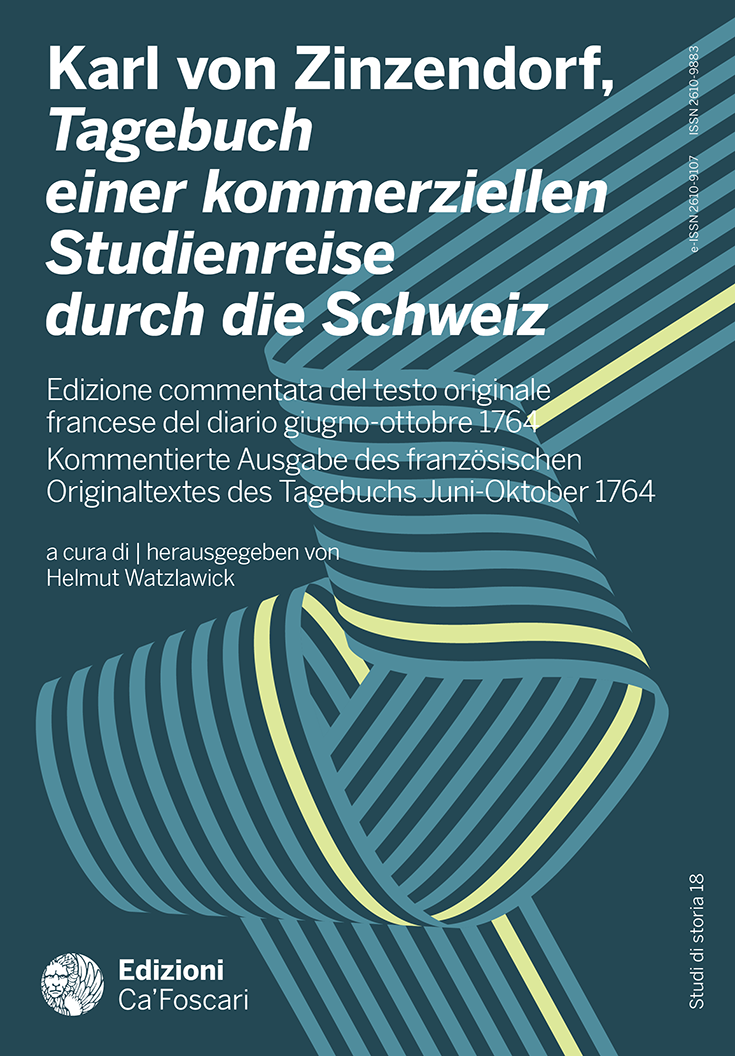
Karl von Zinzendorf, Tagebuch einer kommerziellen Studienreise durch die Schweiz
04 Ottobre 2023 -
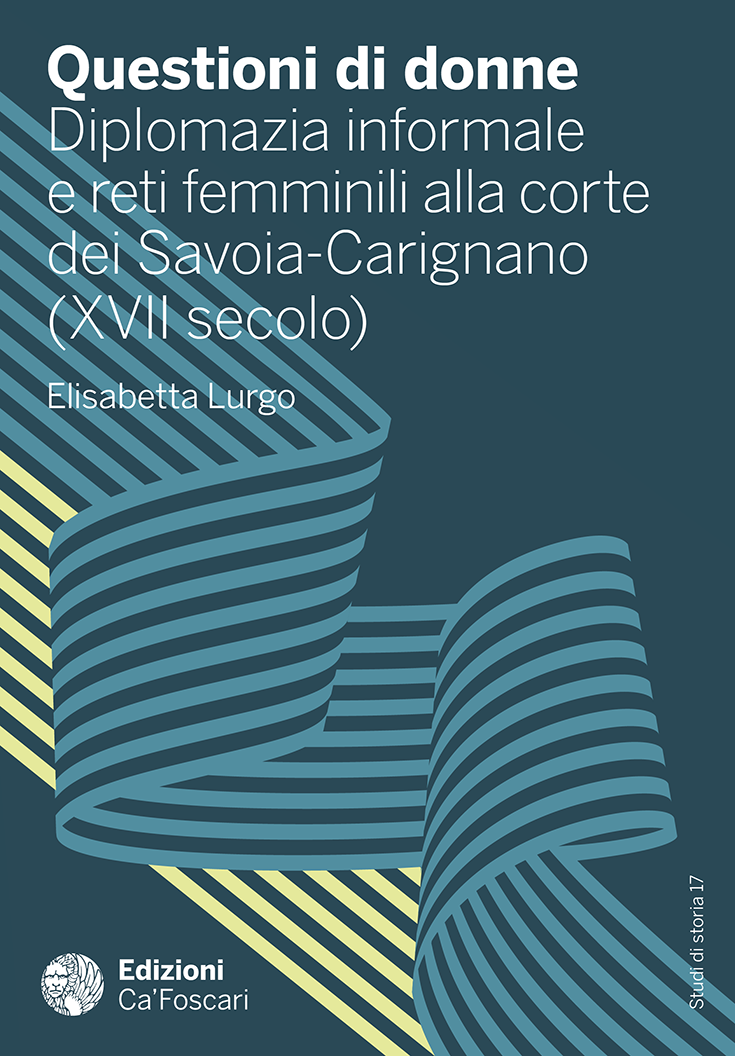
Questioni di donne
13 Aprile 2023 -
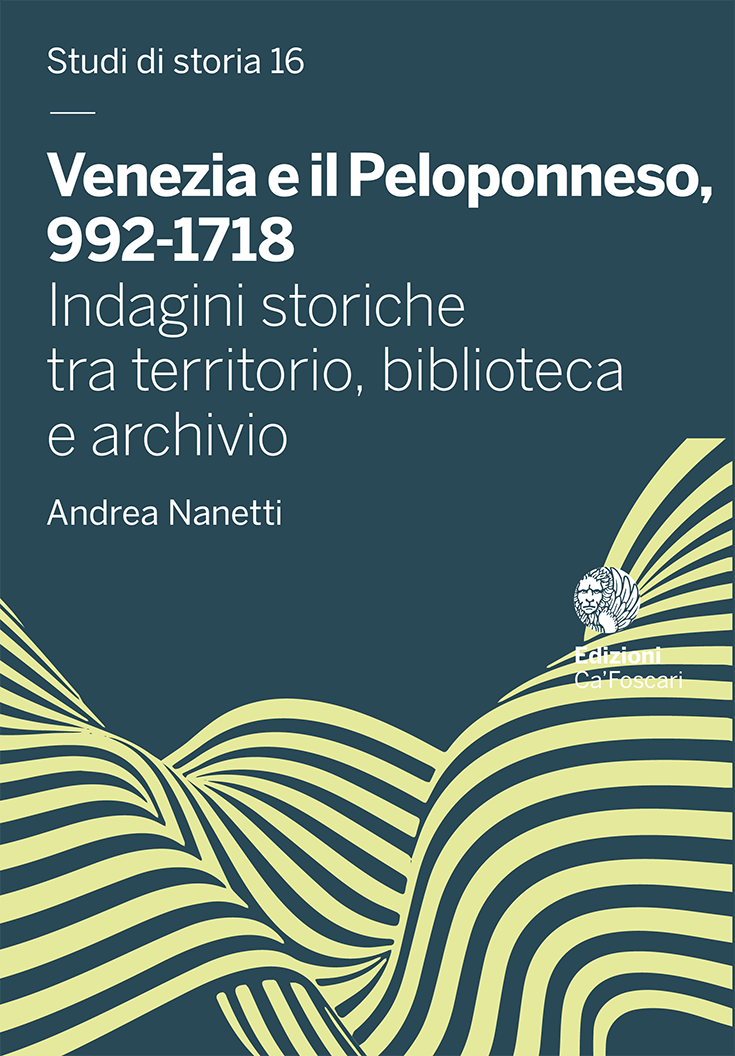
Venezia e il Peloponneso, 992-1718
20 Dicembre 2021 -

Preludio al Ghetto di Venezia
17 Dicembre 2021 -
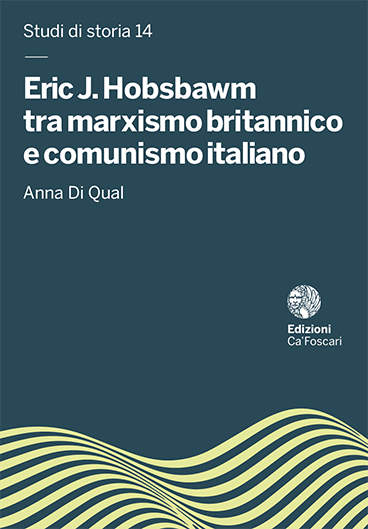
Eric J. Hobsbawm tra marxismo britannico e comunismo italiano
27 Marzo 2020 -
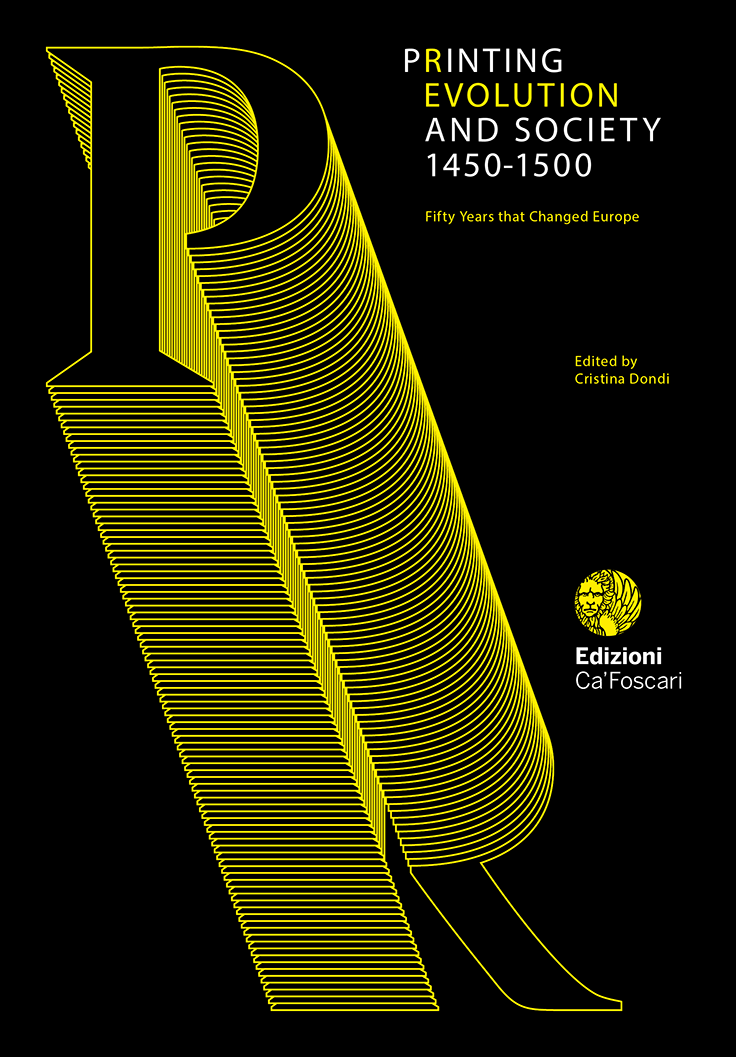
Printing R-Evolution and Society 1450-1500
24 Febbraio 2020 -
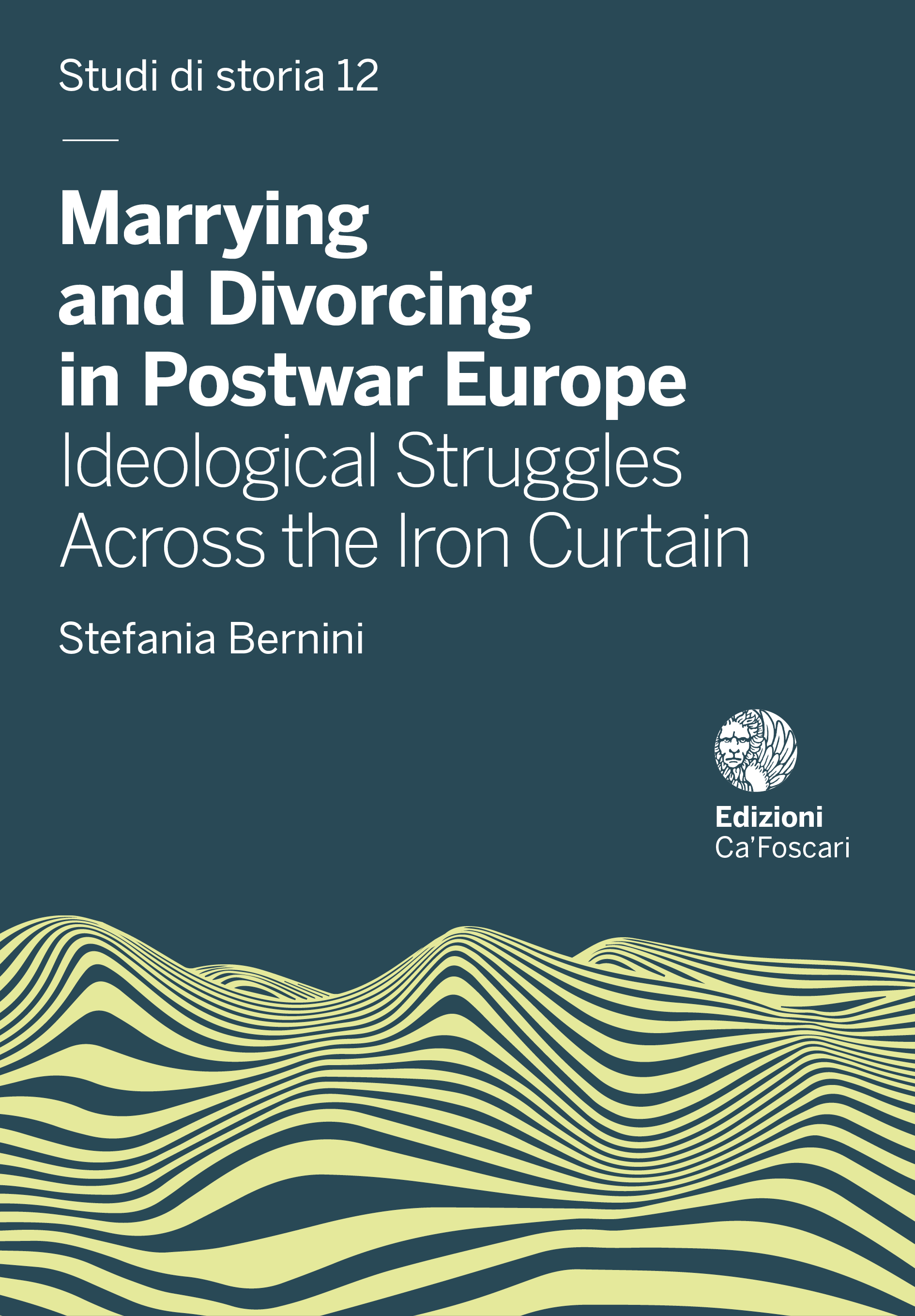
Marrying and Divorcing in Postwar Europe
11 Gennaio 2020 -

The Body, the Liturgy and the City
26 Novembre 2019 -
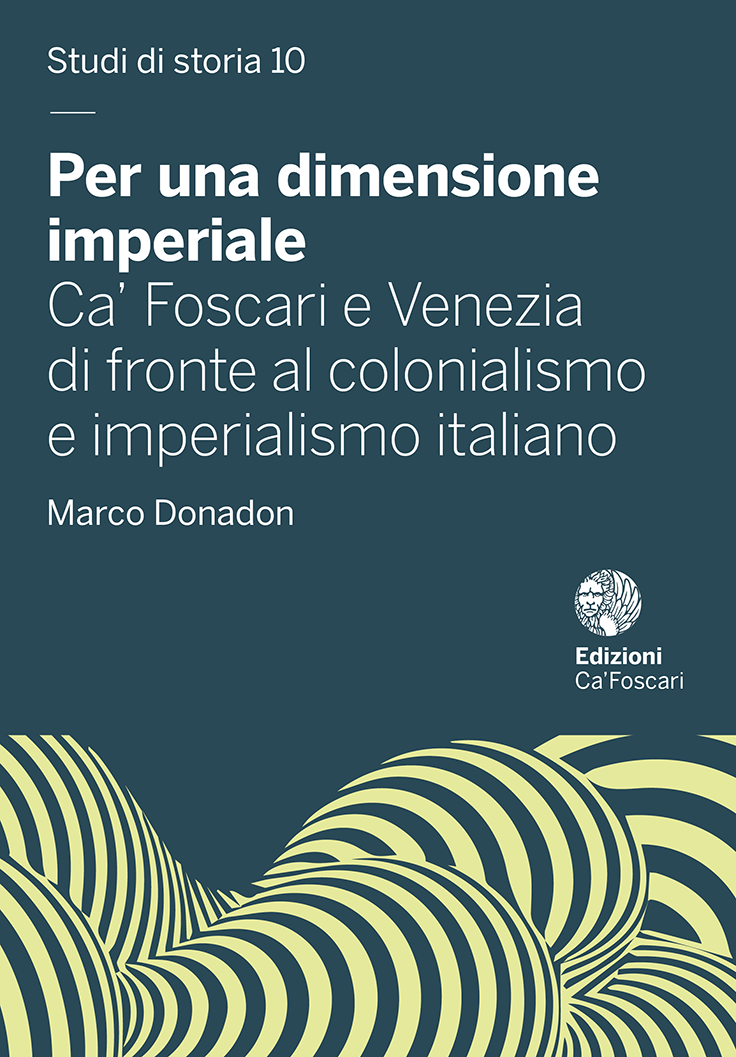
Per una dimensione imperiale
06 Novembre 2019 -

Antisocialismo cattolico
01 Ottobre 2019 -

Genealogie e geografie dell’anti-democrazia nella crisi europea degli anni Trenta
31 Maggio 2019 -
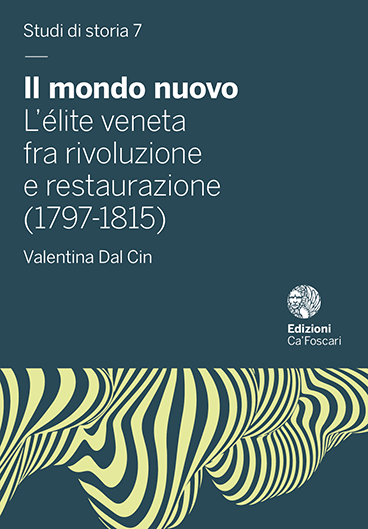
Il mondo nuovo
15 Maggio 2019 -

Lo sguardo lontano
18 Ottobre 2018 -
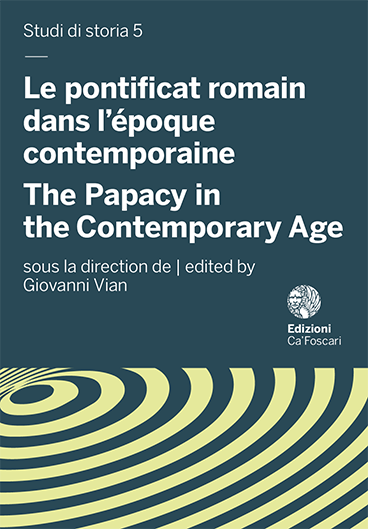
Le pontificat romain dans l’époque contemporaine | The Papacy in the Contemporary Age
06 Giugno 2018 -

Guida alla tesi di laurea in Storia
19 Maggio 2017 -

The Reception and Application of the Encyclical Pascendi
29 Marzo 2017 -

Pio XI nella crisi europea | Pius XI. im Kontext der europäischen Krise
24 Ottobre 2016 -

Historiae
01 Ottobre 2013
Laura Cerasi, Università Ca’ Foscari Venezia, Italia
Mario Infelise, Università Ca’ Foscari Venezia, Italia
Anna Rapetti, Università Ca’ Foscari Venezia, Italia
Comitato scientifico
Claus Arnold, Johannes Gutenberg-Universität in Mainz, Deutschland
Chiara Bonfiglioli, Università Ca’ Foscari Venezia, Italia
Francesco Borri, Università Ca’ Foscari Venezia, Italia
Marina Caffiero, Sapienza Università di Roma, Italia
Marco Cavarzere, Università Ca’ Foscari Venezia, Italia
Stefano Dall'Aglio, Università Ca’ Foscari Venezia, Italia
Giovanni Filoramo, Università degli Studi di Torino, Italia
Marco Fincardi, Alma Mater Studiorum - Università di Bologna, Italia
Stefano Gasparri, Università Ca’ Foscari Venezia, Italia
Mario Infelise, Università Ca’ Foscari Venezia, Italia
Vincenzo Lavenia, Alma Mater Studiorum - Università di Bologna, Italia
Simon Levis Sullam, Università Ca’ Foscari Venezia, Italia
Adelisa Malena, Università Ca’ Foscari Venezia, Italia
Alberto Masoero, Università degli Studi di Torino, Italia
Silvio Pons, Scuola Normale Superiore, Pisa, Italia
Antonella Salomoni, Università della Calabria, Cosenza, Italia
Enzo Traverso, Cornell University, Ithaca, USA
Chris Wickham, University of Oxford, UK
Per sottoporre una proposta di pubblicazione utilizza il form qui disponibile.
Submit a proposalinput
Dipartimento di Studi Umanistici
Palazzo Malcanton Marcorà
Dorsoduro 3484/D
30123 Venezia
I costi di pubblicazione sono regolamentati dall’Editore. Tutte le informazioni sono disponibili alla pagina Pubblicare con noi.
La collana adotta, come modalità di peer review di riferimento, la double blind.
Pertanto, le opere pubblicate hanno ottenuto il parere favorevole da parte di almeno due valutatori esperti della materia, attraverso un processo di revisione anonima (double-blind peer review) condotto sotto la responsabilità della Direzione scientifica della collana. I revisori non hanno contatti diretti con gli Autori e appartengono a istituzioni di ricerca diverse da quella cui la collana è affiliata.
È possibile che la collana adotti, in casi più rari, altri tipi di processi di referaggio, come ad esempio la open review, ovvero una revisione non anonima, oppure una revisione mista che coinvolge un membro del Comitato scientifico e un valutatore esterno. Tali opzioni sono determinate dalle caratteristiche specifiche della ricerca oggetto della pubblicazione, o da altri fattori peculiari che determinano la maggior efficacia delle alternative qui segnalate.
La valutazione è svolta in conformità e aderenza ai criteri scientifici, e ai criteri editoriali di completezza bibliografica e coerenza formale di Edizioni Ca’ Foscari.
Politiche di revisione per le singole sezioni:
- Volume/Fascicolo completo: peer review
- Introduzioni, prefazioni: senza peer review
- Monografie | Saggi | Articoli: peer review
- Recensioni: no peer review
- Editoriali: no peer review
Per una descrizione dettagliata del processo, si prega di consultare la pagina: Certificazione scientifica.
Ethical Code of Studi di storia
Studi di storia is a peer-reviewed scientific book series whose policy is inspired by the COPE (Committee on Publication Ethics) Ethical Code.
Publisher’s responsibilities
The Publisher must provide the Book Series with adequate resources and the guidance of experts, in order to carry out its role in the most professional way, aiming at the highest quality standard.
The Publisher must have a written agreement that defines the relationship with the owner of the Book Series and/or the Editor-in-Chief. The agreement must comply with the Code of Behavior for Publishers of Scientific Journals, as established by COPE.
The relationship among the Editor-in-Chief, the Advisory Board and the Publisher is based on the principle of publishing independence.
Editors’ responsibilities
The Editor-in-Chief and the Advisory Board of Studi di storia alone are responsible for the decision to publish the submitted works.
Submitted works, after having been checked for plagiarism by means of the anti-plagiarism software Compilatio that is used by the University and is made available to us, will be sent to at least two reviewers. Final acceptance presumes the implementation of possible amendments, as required by the reviewers and under the supervision of the Studi di storia Editor-in-Chief.
The Studi di storia Editor-in-Chief and Advisory Board must evaluate each submitted paper in compliance with the Book Seriesʼ policy, i.e. exclusively on the basis of its scientific content, without discrimination of race, sex, gender, creed, ethnic origin, citizenship, or the scientific, academic and political position of the Authors.
Allegations of misconduct
If the Studi di storia Editor-in-Chief and Advisory Board notice (or receive notifications of) mistakes or inaccuracies, conflict of interest or plagiarism in a published book, they will immediately warn the Author and the Publisher and will undertake the necessary actions to resolve the issue. They will do their best to correct the published content whenever they are informed that it contains scientific errors or that the authors have committed unethical or illegal acts in connection with their published work. If necessary, they will withdraw the book or publish a recantation.
All complaints are handled in accordance with the guidelines published by the COPE.
Concerns and complaints must be addressed to the following e-mail ecf_support@unive.it. The letter should contain the following information:
- complainant’s personal information;
- title, author(s), publication date, DOI;
- complaint(s);
- declaration that the complainant has no conflict of interest, or declaration of an actual or potential conflict of interest.
Authors’ responsibilities
Stylesheet
Authors must follow the Guidelines for Authors to be downloaded from the Studi di storia website.
Authors must explicitly state that their work is original in all its parts and that the submitted paper has not been previously published, nor submitted to other publishers, until the entire evaluation process is completed. Since no paper or book gets published without significant revision, earlier dissemination in conference proceedings or working papers does not preclude consideration for publication, but Authors are expected to fully disclose publication/dissemination of the material in other closely related publications, so that the overlap can be evaluated by the Studi di storia Editor-in-Chief.
Authorship
Authors are strongly encouraged to use their ORCID iD when submitting a manuscript. This will ensure the authors’ visibility and correct citation of their work.
Authorship must be correctly attributed; all those who have given a substantial contribution to the design, organisation and accomplishment of the research the book is based on, must be indicated as Co-Authors. Please ensure that: the order of the author names is correct; the names of all authors are present and correctly spelled, and that affiliations are up-to-date.
The respective roles of each co-author should be described in a footnote. The statement that all authors have approved the final version should be included in the disclosure.
Conflicts of interest and financing
Authors, under their own responsibility, must avoid any conflict of interest affecting the results obtained or the interpretations suggested. The Studi di storia Editor-in-Chief will give serious and careful consideration to suggestions of cases in which, due to possible conflict of interest, an Author’s work should not be reviewed by a specific scholar. Authors should indicate any financing agency or the project the book stems from.
Quotations
Authors must see to it that all works consulted be properly quoted. If works or words of others are used, they have to be properly paraphrased or duly quoted. Quotations between “double quotes” (or «angled quotation marks» if the text is written in a language other than English) must reproduce the exact wording of the source; under their own responsibility, Authors should carefully refrain from disguising a restyling of the source’s wording, as though it was the original formulation.
Any form of excessive, inappropriate or unnecessary self-citation, as well as any other form of citation manipulation, are strongly discouraged.
Ethical Committee
Whenever required, the research protocols must be authorised in advance by the Ethical Committee of Ca’ Foscari University of Venice.
Emendations
When Authors find a mistake or an inaccuracy in their own work, they must immediately warn the Studi di storia Editor-in-Chief, providing all the information needed to make the due adjustments.
Reviewers’ responsibilities
Goal
By means of the peer-review procedure, reviewers assist the Studi di storia Editor-in-Chief and Advisory Board in taking decisions on the submitted works. They are expected to offer the Authors suggestions as to possible adjustments aimed at improving their contribution submission.
Timing and conflicts of interest
If a reviewer does not feel up to the task of doing a given review, or if she/he is unable to read the work within the agreed schedule, she/he should notify the Studi di storia Editor-in-Chief. Reviewers must not accept texts for which there is a conflict of interest due to previous contributions or to a competition with a disclosed author (or with an author they believe to have identified).
Confidentiality
The content of the reviewed work must be considered confidential and must not be used without explicit authorisation by the Author, who is to be contacted via the editor-in-chief. Any confidential information obtained during the peer review process should not be used for other purposes.
Collaborative attitude
Reviewers should see themselves not as adversaries but as advocates for the field. Any comment must be done in a collaborative way and from an objective point of view. Reviewers should clearly motivate their comments and keep in mind the Golden Rule of Reviewing: “Review for others as you would have others review for you”.
Plagiarism
Reviewers should report any similarity or overlapping of the work under analysis with other works known to them.